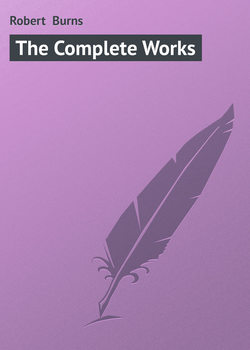Читать книгу The Complete Works - Роберт Бернс, Robert Burns - Страница 49
THE POETICAL WORKS OF ROBERT BURNS
XLVII. EPISTLE TO A YOUNG FRIEND. MAY, 1786
Оглавление[Andrew Aikin, to whom this poem of good counsel is addressed, was one of the sons of Robert Aiken, writer in Ayr, to whom the Cotter’s Saturday Night is inscribed. He became a merchant in Liverpool, with what success we are not informed, and died at St. Petersburgh. The poet has been charged with a desire to teach hypocrisy rather than truth to his “Andrew dear;” but surely to conceal one’s own thoughts and discover those of others, can scarcely be called hypocritical: it is, in fact, a version of the celebrated precept of prudence, “Thoughts close and looks loose.” Whether he profited by all the counsel showered upon him by the muse we know not: he was much respected—his name embalmed, like that of his father, in the poetry of his friend, is not likely soon to perish.]
I.
I lang hae thought, my youthfu’ friend,
A something to have sent you,
Though it should serve nae ither end
Than just a kind memento;
But how the subject-theme may gang,
Let time and chance determine;
Perhaps it may turn out a sang,
Perhaps, turn out a sermon.
II.
Ye’ll try the world soon, my lad,
And, Andrew dear, believe me,
Ye’ll find mankind an unco squad,
And muckle they may grieve ye:
For care and trouble set your thought,
Ev’n when your end’s attain’d;
And a’ your views may come to nought,
Where ev’ry nerve is strained.
III.
I’ll no say men are villains a’;
The real, harden’d wicked,
Wha hae nae check but human law,
Are to a few restricked;
But, och! mankind are unco weak,
An’ little to be trusted;
If self the wavering balance shake,
It’s rarely right adjusted!
IV.
Yet they wha fa’ in Fortune’s strife,
Their fate we should na censure,
For still th’ important end of life
They equally may answer;
A man may hae an honest heart,
Tho’ poortith hourly stare him;
A man may tak a neebor’s part,
Yet hae nae cash to spare him.
V.
Ay free, aff han’ your story tell,
When wi’ a bosom crony;
But still keep something to yoursel’
Ye scarcely tell to ony.
Conceal yoursel’ as weel’s ye can
Frae critical dissection;
But keek thro’ ev’ry other man,
Wi’ sharpen’d, sly inspection.
VI.
The sacred lowe o’ weel-plac’d love,
Luxuriantly indulge it;
But never tempt th’ illicit rove,
Tho’ naething should divulge it:
I waive the quantum o’ the sin,
The hazard of concealing;
But, och! it hardens a’ within,
And petrifies the feeling!
VII.
To catch dame Fortune’s golden smile,
Assiduous wait upon her;
And gather gear by ev’ry wile
That’s justified by honour;
Not for to hide it in a hedge,
Nor for a train-attendant;
But for the glorious privilege
Of being independent.
VIII.
The fear o’ Hell’s a hangman’s whip,
To haud the wretch in order;
But where ye feel your honour grip,
Let that ay be your border:
Its slightest touches, instant pause—
Debar a’ side pretences;
And resolutely keep its laws,
Uncaring consequences.
IX.
The great Creator to revere
Must sure become the creature;
But still the preaching cant forbear,
And ev’n the rigid feature:
Yet ne’er with wits profane to range,
Be complaisance extended;
An Atheist laugh’s a poor exchange
For Deity offended!
X.
When ranting round in pleasure’s ring,
Religion may be blinded;
Or if she gie a random sting,
It may be little minded;
But when on life we’re tempest-driv’n,
A conscience but a canker—
A correspondence fix’d wi’ Heav’n
Is sure a noble anchor!
XI.
Adieu, dear, amiable youth!
Your heart can ne’er be wanting!
May prudence, fortitude, and truth
Erect your brow undaunting!
In ploughman phrase, ‘God send you speed,’
Still daily to grow wiser:
And may you better reck the rede
Than ever did th’ adviser!
